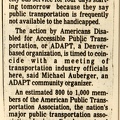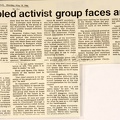The Cincinnati Enquirer Monday, May 19, 1986 Comment/A-7
PHOTO by Jim Callaway/The Cincinnati Enquirer: Three protesters in wheelchairs form a diagonal line across the picture. On the right in the foreground a heavy set man (Jerry Eubanks) sits in his manual wheelchair, a cab of soda in his right hand. He is a double amputee below the hips, and is wearing a look of concentration, and appears to be chanting. His right hand is resting on the back of a motorized wheelchair to his right. In that chair is a slim man (Greg Buchanan) who is wearing a very large sign across his legs that reads "A Part of NOT Apartheid." (The message is a bit obscured by the curve of the sign around his legs.) He is also wearing a light colored ADAPT T-shirt. To Greg's right and a bit further away and behind is a third man in a chair, a slim man with dark hair and a beard (John Short). He also has a sign on his legs but the quality of the picture makes it unreadable.
Caption reads: Members of ADAPT picket in front ol the Westin Hotel Sunday afternoon. Gary Eubanks of Chicago, right, Greg Buchanan of Colorado Springs and John Short of Denver were among them.
Title: Protesters converge on city
Disabled demand full access to public transportation
BY KAREN ROEBUCK
The Cincinnati Enquirer
Former Cincinnatian Mike Auberger said he left the city because of its lack of accessibility to the handicapped and because "the mentality toward people with disabilities is really 19th century at best."
Auberger, who now lives in Denver, is one of about 75 members of ADAPT (American Disabled for Accessible Public Transit) in Cincinnati Sunday through Wednesday demanding full accessibility to public transportation systems for the handicapped.
But the approximately 50 members of ADAPT demonstrating in front of the Westin Hotel, where the American Public Transit Association (APTA) is holding its regional convention, were denied access to the hotel Sunday.
"The only people they're stopping are people in a wheelchair; that's blatantly discriminatory," said Bob Kafka, of Austin, Texas and ADAPT community organizer.
Cincinnati Police Capt. Dale Menkhaus, Operational Support, said public
easements can be barricaded to any group that might disrupt the hotel, which is private property. ADAPT members publicly stated they would try to disrupt the conference and have attempted to do so at other APTA conferences, police and Westin officials said. The hotel's first priority is to its guests, in this case the APTA, said Larry Alexander, general manager of the Westin.
The ADAPT group blocked entrances and exits to the hotel for a short time Sunday, and rode their wheelchairs in downtown streets, somewhat disrupting traffic to the Reds-Pirates game, Menkhaus said, but did not cause any major problems.
Armed with signs, T-shirts and badges, the group chanted slogans expressing their desire to ride public transportation systems. Some of the signs read, "Buses won't roll without us," and "We have a dream. . . We will ride."
Kafka said ADAPT members will most likely try to stop some Queen City Metro buses. In other cities, members have sometimes chained themselves to the vehicles. Murray Bond, assistant general manager of Queen City Metro, said if ADAPT members try to stop the buses, the drivers will put the vehicles into park and let the police move the demonstrators.
Menkhaus said ADAPT members will be arrested if they break the law.
Despite the barricades, ADAPT members also will try to get into the convention, Kafka said, to get a resolution requiring full accessibility for the handicapped onto the convention floor.
Albert Engelken, deputy executive director of APTA, said the executive committee and board of directors have discussed voting on such a resolution, but decided that decision should be made at the local level.
Every system in the country has some way of transporting the handicapped, he said, which was decided upon with the advice of local agencies for the handicapped. About 30% of the systems nationwide are fully accessible, he said.
Queen City Metro has an access program which will pick up handicapped people at their homes and take them where they need to go in Cincinnati, Elmwood Place, St. Bernard and Norwood, Bond said. "We understand their goals of total accessibility. It's certainly a laudable one, but also a very expensive one."
The customer pays 60 cents for a ride, but it costs Queen City Metro about $10, he said. A ride must be scheduled 24 hours in advance under the Queen City's rules, but space is not always available, said Dixie Harmon, co-chairperson of the Specialized Transportation Advisory Committee to Queen City Metro and a member of Greater Cincinnati Coalition of Persons with Disabilities.
"They dictate our lives to us, because we have to go and come as there's space available," she said.
Kafka said ADAPT does not expect public systems to make all their buses wheelchair accessible, only all new buses. In about 20 years, the entire system could then be used by the handicapped, he estimated, pointing out that Queen City now owns 87 buses with wheelchair lifts, but the lifts have been locked down.
Bond said those buses were bought with federal money at a time when wheelchair accessibility was required for any purchased with federal funds, and would be too costly to operate.
The Greater Cincinnati coalition supports the goals of ADAPT, Harmon said, but chooses to negotiate for changes instead of demonstration.
- Created on
- Thursday 11 July 2013
- Posted on
- Wednesday 8 June 2016
- Tags
- 24 hour advanced reservation, ADAPT - American Disabled for Accessible Public Transit, Albert Engelken, APTA - American Public Transit Association, arpartheid, Austin, Bob Kafka, chants, Chicago, Colorado Springs, cost, Denver, discrimination, Dixie Harmon, full accessibility, Greater Cincinnati Coalition of Persons with Disabilities, Greg Buchanan, inaccessible buses, Jerry Eubanks, John Short, lifts bolted down, Mike Auberger, protesters, resolution, signs, wheelchairs
- Albums
- Visits
- 6733
- Rating score
- no rate
- Rate this photo


0 comments